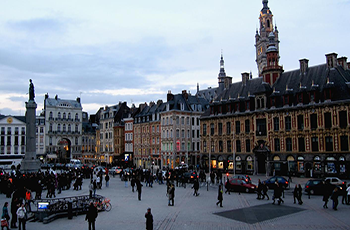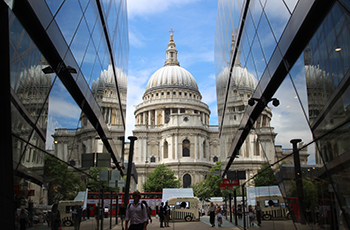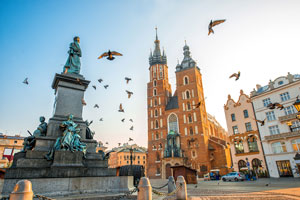Tips for Studying Abroad in 2017
March 1st, 2017
France (Provence)- Zoe

Image Source: Bonjourzoe
Participating in an exchange program was one of the most rewarding experiences in my life. As a bit of background, I grew up in Hong Kong and was only 17 at the time. I wanted to study abroad but wasn’t sure if I was ready, so I did some research and realized that there were options to test the waters. The idea seemed a little bit terrifying at first, but I told myself screw it, let’s do it and took the plunge to go to France for one academic year.
5 Things I Learnt From My Exchange Year in France
LEARNING FRANÇAIS – I didn’t know any French and I lived in a very small town in Provence, so most people didn’t speak English very well. By immersing myself in an environment where I had absolutely no choice but to speak the language was actually the best way to learn. I didn’t have a smart phone, so I carried a pocket dictionary with me everywhere to get by! I also read lots of Beginner’s French textbooks and did practice exercises every day to speed up the process. Guess what? By the end of the year, I was pretty fluent and had no problems engaging in day-to-day conversations.
ALWAYS TIRED – I was constantly drained for the first few weeks so I thought I was jetlagged. But that didn’t stop for another few months... Turns out when you’re in a new environment experiencing new things and trying to learn a new language, it can really, really wear you out even if you aren’t actively doing anything. Your body is taking it all in and your brain is always working hard to process new information. Once I started understanding French better and got used to the new lifestyle, the sleepy head in me went away! That wasn’t something I expected at all, but isn’t it interesting (and weird) how the human body works?
NEW FAMILY – I lived with a French family during my entire stay, but unlike some of the other exchange students who integrated really well into their host families, I didn't. I couldn’t really get myself to feel fully comfortable around them, but being a "guest" in someone else’s home was a really unique experience and taught me a lot – their family traditions, general routines and interactions, cultural differences, special recipes… Interesting things you might not be able to experience outside of a local home even if you live abroad, so if you have the choice to live like a local, I highly recommend it.
INTERPERSONAL SKILLS – I normally don’t like the phrase "interpersonal skills", but it was one thing I definitely gained from my exchange experience. Again, I was only 17 and I had a pretty sheltered childhood. After just one year, I really grew up and became a completely different person just because I stepped outside of my comfort zone – I became the girl who went all the way to another continent to learn a new language from scratch. I became the girl who took the train across a foreign country all by herself to explore. I became the girl who can do anything!
I WAS READY – As I mentioned, one of the reasons that I went to an exchange program was to test the waters and see if I was ready to study abroad. And I had my answer – I was 100% ready, so I made the decision to go to Toronto to continue my education. I became a much more independent person and the idea of living across the globe was no longer intimidating. I had learnt to take good care of myself and was ready to experience a brand new culture. And of course having a new language in my pocket that happens to be one of Canada’s official languages didn’t hurt either!
United Kingdom (London)- Joyce

Image Source:Joyce Chiu
London - a metropolis encompassing a multitude of cultures; a creative hub brimming with new ideas; a modernized city that retains its historic value; a vibrant city that presents itself as the place to be, the place where there is always something happening. Given the opportunity, who wouldn’t want to spend a year in London?
Culture and Lifestyle
Despite London’s efficient public transportation, one of my favourite things to do was to walk around the city and explore the different neighbourhoods. My favourite bit of London is the West End, where most of the theatres are located in addition to plenty of boutiques and cafes; here’s a tip - many theaters offer day seats which means that you can purchase standing or front-row seats to a live performance for less than £20 if you get there early in the morning! I also highly recommend walking along South Bank starting from the iconic London Eye to Borough Market or vice versa - it is a scenic route that never fails to make me smile.
Study Abroad
I studied abroad not only because it complemented my studies - English Literature and European Studies - but also because I wanted to immerse myself in an entirely different country and culture. It is such an enriching experience to live abroad; there is so much one can learn about oneself and the world when travelling. It truly makes the world a lot smaller, especially once you start befriending people from all around the world. Advice I would give myself is to not worry too much about money and whether something is "worth it" because living abroad is a life-changing experience that is worth every single penny. Three essential things to bring with you are: a camera, a good pair of shoes, and an open mind.
London can be overwhelming and lonely, but London has a bit of everything for everyone - it is all a matter of finding your community. And once you’ve done that, it’s almost impossible to not fall madly and quickly in love with the city.
Germany- Dora
Education in Germany
It wasn’t until two years after I completed my Bachelor’s program that I decided to pursue a two-year Master’s degree in Molecular Medicine in Germany. Germany offers top-class education, especially in the field of science and engineering, with low or no tuition. Another reason behind choosing Germany was to challenge myself to stay in a country where I don’t know the language and learn to speak it.
Historical Culture
Germany contains a rich historical heritage, and part of its long, fascinating history is embedded in its architecture. The city of Ulm, where my university is located, is the birthplace of Albert Einstein, and home to the tallest church in the world, Ulmer Münster. Germany is also located in the heart of Europe, which makes it very convenient to visit neighboring countries during your time abroad.
Picking Up a New Language
Although my program is conducted in English, I have learnt basic conversational German in the 6 months I’ve been here. One of the most common words used is “Prost”, which means “Cheers” in German. One of my favorite things about studying in Germany is that I have so much to learn from my German classmates. They are very focused and on top of their studies, yet know when to be laidback and enjoy a beer or two after class or exams.
Useful Tips
Some tips for studying abroad in Germany are that punctuality is taken very seriously. Also, do not feel intimidated when German classmates do not seem friendly at first or seem to be rude, it takes a little longer for them to warm up and most of the people are just straightforward. However, once you get to know them, you can kick back and enjoy some nice German beer. Prost!
Hong Kong - Julie

In 2014, I did my exchange in Hong Kong and I was there for a period of 3 months studying in University of Hong Kong as an undergraduate student coming from Canada. One of the major reasons I wanted to go study abroad is to immerse myself in a new culture, and be able to adapt to new environments. Along the way I become good friends with the local students and other exchange students from other countries. This connection was invaluable. I learned a lot about the pop culture within Hong Kong, which taught me the different perspectives that youths around the world have: an experience you’ll never get if you didn’t live in a city abroad and immerse locally in their culture. A local word I commonly used while abroad was “Mm goi”, which means thank you.
The 3 essentials to bring abroad: a copy of all your important documents, clothing for all temperatures and an electronic device capable of connecting to the internet.
One crucial piece of advice I would have given myself before studying abroad is to expect things to go wrong - I had my phone stolen 5 times.
The efficiency of the transportation in Hong Kong is my favourite thing about this city. The cheap and easy public transportation system did not limit me from seeing everything this city has to offer, even remote islands were easily accessible through ferries and buses!
Poland (Zabrze)-Chiara

Never had I imagined I would ever set foot in Eastern Europe, especially Southern Poland. I have visited many cities in Western Europe and imagined Poland to be similar. Seeing every corner on the street with its own story to share, a history lesson to teach. Zabrze, on the other hand, is nothing like the Europe I imagined. It is a city in Silesia in south Poland and used to be an important mining center.
Moving to a New Country
When I was given the opportunity to pursue Dentistry in Zabrze, I knew there would be a lot to sacrifice. It includes moving a to a brand new country I never visited and be be able to get through the 5-year dental program. Yet in return, being in Europe gives me ample opportunities to travel when there is holiday. This became one of my most desired motivations to accept the program.
Polish Culture and Lifestyle
As of now, I have completed my first semester of dental school, got accustomed to the Polish culture and travelled to some neighboring cities and countries. I quickly adapted to this new country, new culture, new life and learned basic daily conversations. Despite being in a new environment, there is one aspect that remains the same in all culture, which is always showing gratitude and appreciation by saying thank you. Naturally, the first Polish I learned is “Dziekuje”, pronounced as “Jink-wee-ya”. Although I believe Poland doesn’t offer as rich a history as its neighboring European countries, its beautiful nature is still worth seeing with your own eyes and I do recommend visiting Poland at least once in your life.
Argentina (Buenos Aires, Puerto Madryn) - Sonia

Image Source: Evelyn Proimos
3 Essentials
3 things I would recommend anyone to bring if they wish to study abroad in Argentina: A Spanish-speaking friend, an empty stomach and an AFA soccer jersey! I had the opportunity to study in 2 Argentine cities over 5 weeks in 2014. It was an absolutely amazing experience exploring new culture, making new friends and living in Patagonia for the first time.
Culture and Lifestyle
With a rich culture influenced by the Spanish colonial period, it is not uncommon to see locals grabbing coffee at 6 p.m. after work and dinner at 10 p.m. on a regular day, which was quite hard to adjust to at first as a student from North America, but their delicious food definitely made up for it. Always make sure to ask for Dulce de Leche snacks with a Matte drink!
Getting Around
Navigating around the capital, Buenos Aires is relatively more tourist friendly than in Puerto Madryn as the former place is a hub for universities with a larger English-speaking population. As much as they are very friendly and welcoming, most Argentinians only speak Spanish and it could be difficult if you do not have any Spanish background or friends that can help you out when needed. Studying some basic Spanish is probably one of the bits of advice that I would have found useful prior to studying abroad in Argentina.
Lastly, you should never miss a soccer game when it involves the national team! I was lucky enough to be in Argentina during the World Cup FIFA Finals- in Buenos Aires, you will find the locals either at restaurants or bars watching a live stream of the event or at Plaza San Martin singing the national anthem and waving the national flag. Argentina probably has the world’s most supportive soccer fans and you would not want to miss out on that!
Vietnam (Ho Chi Minh City/Saigon)- Timothy
In 2016, Timothy went to study abroad at Vietnam with another group of students from University of Toronto. Click here or below to see more of his study abroad experience through photographs- let the photos speak for themselves!
Created with Admarket's flickrSLiDR.
South Korea (Seoul) - Sophia
3 essentials...or none!
When studying abroad in South Korea, I would suggest not bringing a lot with you- bring empty luggage and load it with goodies instead! South Korea, in particularly Seoul is known as a shoppers’ paradise, where you can get anything you want at anytime (there is a large shopping mall in Dongdaemun that opens 24 hours).
Culture and Lifestyle
I studied the Korean language and culture for a span of 3 weeks in a local university in Seoul. I was immediately humbled by how welcoming and generous people are in South Korea upon arrival at the city. South Korean locals may not all speak English, but they are very willing to help foreigners and even walk them to their destinations, which is unlikely in other big international cities where everyone is rushing through their schedules. This generous gesture probably derived from their cultural emphasis on being respectful to their seniors and caring for people in their surroundings. There is also a hierarchical element in their language, that you have to speak with polite terms to your senior and normal terms to your peers.
With the fastest Internet connection in the world and as the founding place of companies such as Samsung and LG, South Koreans are very tech-savvy. There is always an app or application to make lives easier in the country, for example, universities have apps that display status and location of empty seats in the libraries to avoid over-crowding in the same library.
Food Culture and Sightseeing
Coffee is a very big part of South Korea's food and social culture, you will see working adults or students in groups having americano in the morning, after lunch or even before dinner. Locals also love to share their food and that is why restaurants usually make dishes in large portions for sharing.
The benefit of studying in Seoul is that it is accessible and convenient - you can visit the traditional folk village, famous temples such as Gyeongbokgung Palace or the museums, all in minutes via underground transportation. I really enjoyed this advantage as a student studying the Korean language and culture, that I can easily conduct field research and return to the city core in a short period of time.
ABOUT THIS PAGE
Psiphon Today is brought to you by Psiphon Inc. Please visit our Privacy Policy, and find out how you can contact us.


